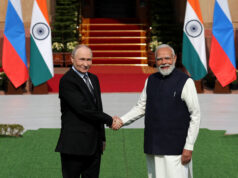Pakistan’s Prime Minister Shehbaz Sharif urged the expansion of China’s Belt and Road Initiative (BRI) to boost regional cooperation during a meeting of the Shanghai Cooperation Organisation (SCO) in Islamabad on Wednesday. The SCO, a Eurasian political and security group, was formed in 2001 and includes major nations such as China, Russia, India, and Pakistan.
Expansion Of Belt And Road Initiative
Sharif highlighted the importance of China’s BRI, a $1 trillion infrastructure and energy network project that aims to connect Asia, Africa, and Europe. Launched by President Xi Jinping a decade ago, the BRI focuses on building roads, railways, and digital infrastructure to improve regional integration. Sharif called for the expansion of these efforts, emphasising the need for greater cooperation across SCO countries.
“Flagship projects like the Belt and Road Initiative of President Xi Jinping…should be expanded focusing on developing road, rail and digital infrastructure that enhances integration and cooperation across our region,” Sharif said during his address as chair of the meeting.
The China-Pakistan Economic Corridor (CPEC), a significant component of the BRI, has seen China invest billions of dollars in Pakistan’s infrastructure, including road networks, a strategic port, and an airport. Sharif praised CPEC as a key driver of regional cooperation.
Challenges And Criticism of BRI
Although more than 150 countries, including Russia, have joined the BRI since its launch, the initiative faces criticism from rival nations and Western powers. Some see the BRI as a tool for China to expand its geopolitical and economic influence. Last year, the G7 nations announced a $600 billion initiative to rival China’s connectivity projects.
Additionally, critics argue that the BRI creates unsustainable debt in developing countries. Despite this, Sharif remains a strong advocate for BRI’s role in fostering regional integration and growth.
Stability In Afghanistan And Regional Cooperation
Sharif also stressed the importance of stability in Afghanistan, which lies between South and Central Asia, as crucial for unlocking the trade potential for SCO member states. He proposed the creation of a special development funding mechanism under the SCO to further strengthen regional cooperation.
India-Pakistan Relations At The SCO
India’s External Affairs Minister, Subrahmanyam Jaishankar, also attended the SCO meeting, marking the first visit by an Indian foreign minister to Pakistan in nearly a decade. Despite frosty relations between the nuclear-armed neighbours, Jaishankar congratulated Pakistan on its presidency of the SCO Heads of Government Council and expressed India’s support for regional cooperation.
In his speech, Jaishankar stressed the importance of mutual respect, territorial integrity, and sovereignty in regional cooperation, indirectly referencing tensions between India and Pakistan. “If activities across borders are characterised by terrorism, extremism, and separatism, they are hardly likely to encourage trade, energy flows, connectivity, and people-to-people exchanges,” he said, without naming any specific country.
India has long accused Pakistan of supporting insurgencies in Kashmir, a claim Pakistan denies, asserting that it only provides diplomatic support to Kashmiri groups. Conversely, Pakistan accuses India of backing militants within its borders, which New Delhi denies.
The two nations also continue to face border disputes with China, complicating their relations within the SCO framework.
(With inputs from Reuters)





